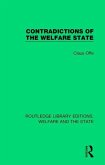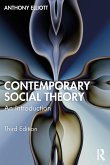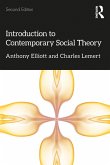Back in 1972, German political sociologist Claus Offe published a book on the Structural Problems of Late Capitalism which, for almost two decades, inspired and stimulated an international and transdisciplinary debate on the role of the state in contemporary capitalism. An academic debate which, paradoxically, began to wane as the issues about which Offe had been writing became even more prominent: the "Contradictions of the Welfare State" (the title of a collection of Offe's main contributions to the debate published in English in 1984) and democratic capitalism's reality of the permanent "crises of crisis management". Since 2008, it has again become a widely shared diagnosis that advanced capitalism is in crisis. However, there is either scholarly disagreement or (more often so) mere perplexity when it comes to understanding this crisis and to explaining the prevalent patterns in dealing with it.
In this volume, Jens Borchert and Stephan Lessenich critically combine a reconstruction Claus Offe's approach to state theory with an analysis of the current constellation of democratic capitalism based on that same theory. In doing so, they expertly argue that his relational approach to state theory is much better equipped analytically to grasp the contradictory dynamics of the financial crisis and its political regulation than competing contributions. This is why systematically revisiting the theory of "late capitalism" is not only of a historical concern, but constitutes an essential contribution to a political sociology of our time.
In this volume, Jens Borchert and Stephan Lessenich critically combine a reconstruction Claus Offe's approach to state theory with an analysis of the current constellation of democratic capitalism based on that same theory. In doing so, they expertly argue that his relational approach to state theory is much better equipped analytically to grasp the contradictory dynamics of the financial crisis and its political regulation than competing contributions. This is why systematically revisiting the theory of "late capitalism" is not only of a historical concern, but constitutes an essential contribution to a political sociology of our time.
'This the first book to systemically reconstruct and extend the work of Claus Offe, who provided one of the most powerful analyses of the capitalist state among the first generation of contemporary critical state theorists. Offe was one of the only state theorists to analyse the 'double bind' of legitimation and accumulation and to explore how these contradictory demands on the capitalist state generate policy failure as a systematic feature of the capitalist state. The authors not only provide an excellent reconstruction and analysis of Offe's critical state theory, but extend his insights to an analysis of the contemporary financial crisis of global capitalism.' - Clyde W. Barrow, Chair, Department of Political Science, University of Texas - Rio Grande Valley
'This fascinating social analysis, with many intriguing qualities of a "whodunnit", creatively explores and systematically interrogates the work of the cheerfully eclectic, frequently contrarian, often misunderstood, conjuncturally sensitive, and always provocative Claus Offe, a seemingly permanent fixture yet moving target in diverse disciplines. While presenting almost everything you need to know about Offe, Jens Borchert and Stephan Lessenich organize their intellectual and political analysis around Offe's distinctive contradiction-sensitive, relational analysis of the conflictual and improbably stable relation between democratic capitalism and the capitalist state, distinguish different phases in his intellectual and political biography as a critical social scientist and public intellectual who is always engaged with important issues, and provide valuable and provocative reasons for why we must continue to engage with Offe's work. They show why this Offe is one that we should not refuse!' - Bob Jessop, Distinguished Professor of Sociology, Lancaster University
'This fascinating social analysis, with many intriguing qualities of a "whodunnit", creatively explores and systematically interrogates the work of the cheerfully eclectic, frequently contrarian, often misunderstood, conjuncturally sensitive, and always provocative Claus Offe, a seemingly permanent fixture yet moving target in diverse disciplines. While presenting almost everything you need to know about Offe, Jens Borchert and Stephan Lessenich organize their intellectual and political analysis around Offe's distinctive contradiction-sensitive, relational analysis of the conflictual and improbably stable relation between democratic capitalism and the capitalist state, distinguish different phases in his intellectual and political biography as a critical social scientist and public intellectual who is always engaged with important issues, and provide valuable and provocative reasons for why we must continue to engage with Offe's work. They show why this Offe is one that we should not refuse!' - Bob Jessop, Distinguished Professor of Sociology, Lancaster University








